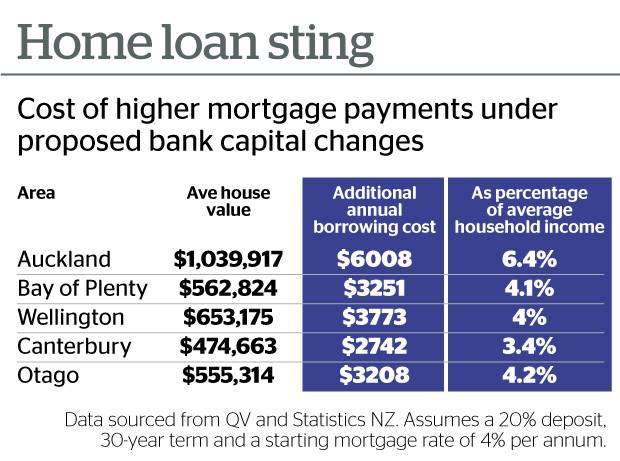Proposed changes to increase the amount of capital banks hold could add $6000 a year to the cost of an Auckland mortgage and have a "significant negative impact" on the economy, Westpac bank is warning.
The New Zealand arm of the Australian-owned bank has made public its submission to the Reserve Bank's proposed capital changes.
Submissions closed last Friday on the RBNZ's proposals which include a near doubling of the minimum common equity banks should hold from 8.5 per cent currently to 16 per cent.
The proposed increase is designed to make banks safer and better designed to handle periods of financial stress by holding enough capital to reduce the probability of a financial crisis in New Zealand to a one in 200-year event.
Start your property search
Westpac's general counsel Mark Weenink said in its submission that it supported the RBNZ's objective of ensuring that New Zealand banks were well capitalised but believed the proposals "go significantly further than is required" and go "well beyond international norms".
"In particular, WNZL considers that the proposals are unnecessarily conservative and, if implemented, will significantly impact the cost and quantity of credit available to New Zealand borrowers."
Westpac said it estimated the increase in capital could up the cost to borrowers by adding more than 100 basis points to the interest rate on a home loan - an increase of around $6k to an average home loan in Auckland.

The calculation assumes a 20 per cent deposit on an average Auckland house costing $1,039,917 with the interest rate on a 30-year mortgage rising from 4 per cent to 5 per cent.
That is in contrast to the central bank's forecasts that its proposals would have a minimal impact on borrowers adding somewhere between 20 and 40 basis points to home loan rates.
Westpac said the proposal to require banks to hold 16 per cent in tier one capital was significantly higher than overseas jurisdictions and given banks hold a buffer the practical effect would be an increase to 18 per cent of risk-weighted assets.
That would see Westpac's capital increase by around $4.5 billion and more than $25 billion across the sector, it said. In order to fund growth of 3 per cent over the proposed five year transition period Westpac would need to raise $6.5 billion.
Westpac said the RBNZ was also proposing to increase the risk weightings on New Zealand banks' assets substantially beyond international comparable risk measurements without providing quantitative justification.
"The effect of this proposal would be to increase the cost to borrowers and to place New Zealand's producers at a disadvantage to international competitors."
It also said the central bank's proposals were overly conservative by excluding some forms of capital instruments.
Westpac said the proposals did not adequately consider the adequacy of current minimum capital requirements or assess the probability of a crisis based on the current capital level.
"The RBNZ has not considered whether there is, in fact, a problem with current capitalisation and consequently, has not defined the problem the proposals seek to solve."
It said at the core of the proposals was the requirement on New Zealand banks to increase their common equity tier one capital by $20 billion but the consultation paper did not appear to support that aspect.
Westpac warned the consultation paper did not adequately address the cumulative impact of each element of the proposals and in particular the changes to risk weightings.
"As a result, the cost of the proposal, and the impact on the economy, have been significantly underestimated."
Westpac said it was likely the proposal would have a significant negative impact on the economy with an annual drag of approximately 1.3 per cent of GDP as result of higher borrowing costs and restrained lending capacity resulting from credit rationing.
The bank said the proposals also ignored current bank capital levels in New Zealand relative to international markets.
"A key consequence of the disconnect in capital requirement would be to cause new Zealand producers to be at a material disadvantaged in international markets as a result of higher funding costs and restricted access to credit."
Westpac's warning follows concerns by the New Zealand-owned banks that the proposal would widen the competitive gap between large and small banks rather than reduce it, a submission from four New Zealand-owned banks has warned.
Kiwibank, TSB Bank, The Co-operative Bank and SBS Bank have joined together to submit to the Reserve Bank's proposals and said while they supported in principle the banking industry's submission there were "some matters of specific relevance to the group".
The Reserve Bank received 164 submissions to its proposals and has said it will make its final decision on the new capital rules by the end of November.
It will publicly release all the submissions next month along with its summary.
Implementation of any new rules would start from April 2020 with a transition period of several years.
The Reserve Bank has said it is also in the process of appointing external experts to independently review the analysis and advice underpinning its proposals.
- New Zealand Herald

















































































